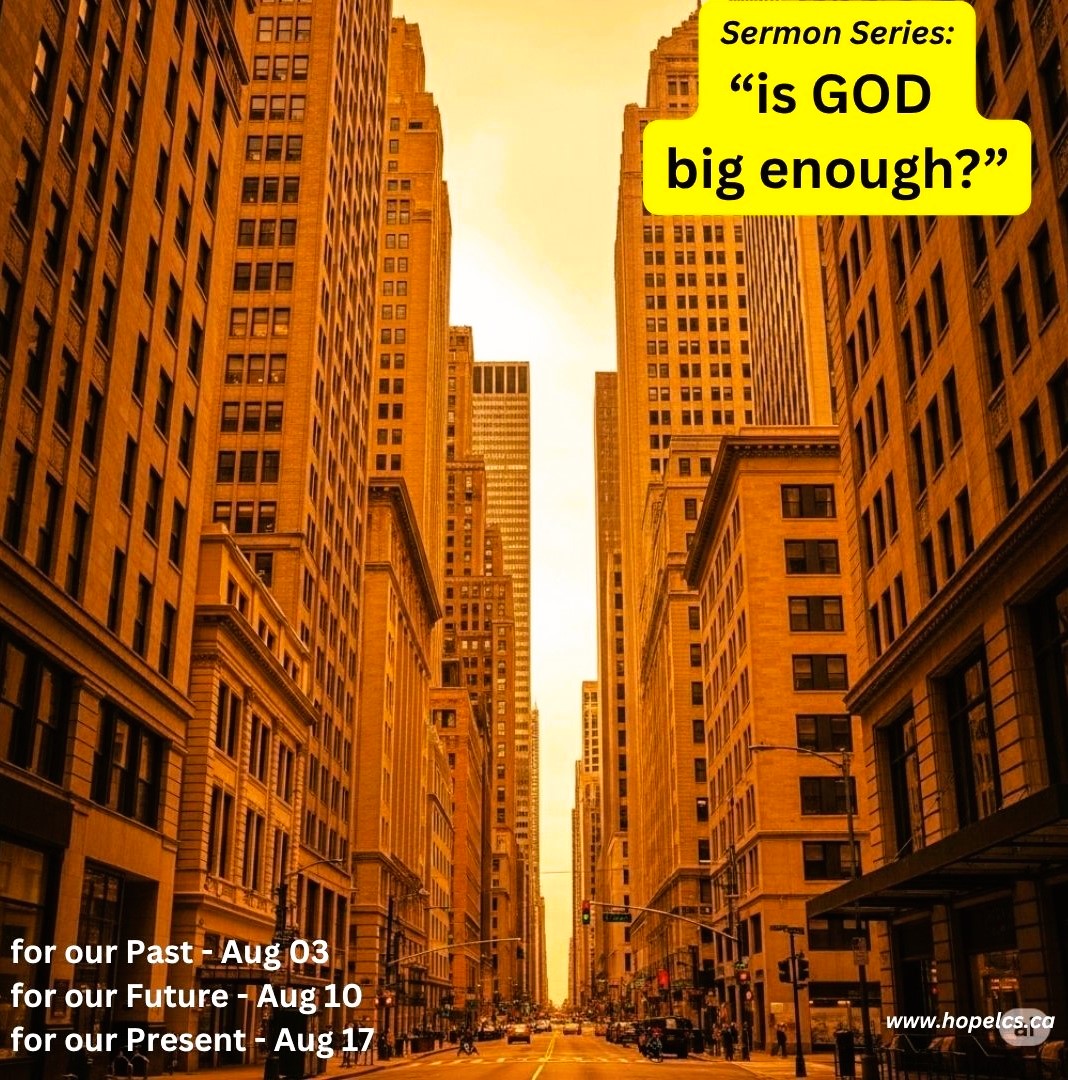
Sermon – August 3rd, 2025
Hope Lutheran Church, Port Coquitlam BC
Series: Is God Big Enough?
Week 1: For Our Past
Texts: Hosea 11:1–11 | Colossians 3:1–11
___________________________
Intr – The weight of 3AM thoughts about your past, have you been there? “What if people knew what I’ve done? What if I can’t outrun my mistakes? What if what I’ve done is unforgivable?” That may be 4pm also. Or at dinner time. Anywhere, any time. I have counseled people during my ministry who five, ten,twenty years or more later, still couldn’t get over a fact of their life. They simply couldn’t shake off guilt and shame.
Our series today asks if God is big enough for our past because that is often a problem we stumble upon: coming to terms with our past. Today we reflect about ways in which our dealing with the past leaves us wondering: is God big enough to take care of it?
1 – The Problem
When does the past become a problem for us? I think the main reason is, when our concerns, shame and struggles undermine our trust in in God’s promise.
Sometimes we live a season in life as “semi-atheists” regarding our past: we know mistakes and sins in the past have only one cure: forgiveness. We know about forgiveness, we come to church and receive it… but then, we struggle to accept it. I am not talking about remembering a fact – there are things that we will never forget. I am talking about the feelings, emotions, remorse, guilt and shame that come with it, and worse of all, stay with it. Our past becomes our identity. “I am the person who…”. To make things worse, if it was captured on camera or someone has a print screen of it, the internet will never let it go away.
Then, this triggers the whole “you must forgive yourself” trend. We believe God forgives us, but we still think we have a job to do that depends on our ability. Sometimes even therapists may tell us that’s the way forward. Then, instead of looking to God for comfort and healing, we look inside ourselves for the power to do so.
You see, our mind and our nature are so tricky when it comes to the past; that we don’t just struggle with the past tense – what we did yesterday – but we struggle also with the perfect past tense – with what we had done years before that. We carry shame about who we had been before we even knew better. The past perfect tense of our lives – those actions that were completed long before our current struggles even began.
“If I had…” statements (Conditional Perfect):
- “If I had been a better father, my son wouldn’t have rebelled”
- “If I had spoken up, that person might still be alive”
- “If I had taken that job opportunity, my whole life would be different”
“I should have…” statements (Past Conditional):
- “I should have been there when she needed me most”
- “I should have said ‘I love you’ before he died”
- “I should have been the kind of person who…”
“I could have…” statements:
- “I could have been a better mother”
- “I could have prevented this tragedy”
- “I could have made different choices”
In all these things, the question lingers: Is God big enough for my past? For I just can let it go away. It keeps coming back to haunt me. Our past can become the most unbearable and most unsolvable problem we carry day in, day out.
Shame and regret. When we place too much on our hearts and shoulders, then God seems to be not big enough for our past.
2- God’s Heart for Your Past
“So pastor, are you saying we shouldn’t deal with the past, we should only live in the present?” Not necessarily. The point is that, as a Christian living in Jesus, you don’t need to be enslaved by your past, at least not in the sense of the emotional hurt and shame sin has caused you. You can have memory, and you will have it. But you don’t need to have a special place for the emotions your past sins made you feel. Actually, what do we do when the past hurts our heart away is that we look to the one who can restore our trust and leads us to work on the things that undermine our trust in him. We look to the past for healing for our past.
In Hosea 11:1–4, God remembers with tenderness: “I taught Ephraim to walk… I led them with cords of kindness…” In Hosea 11:8–9, we hear His heart break: “How can I give you up? … My compassion grows warm and tender.” God knows your past. God doesn’t have amnesia about it, He knows it all. But He has something bigger than memory: mercy. God is the one who knows everything about you and still loves you. His mercy embraces your life and engulfs your past mistakes, shame and guilt with his tender mercy of his love.
Look to today’s epistle, Colossians 3:3 saying: “You have died, and your life is hidden with Christ in God.” Your past self—however sinful, however broken—has died.
Your present self is secure in Christ, and God’s love for you reaches back further than your failures. Even your past-perfect regrets are covered. Hosea begins with “When Israel was a child, I loved him.” God’s love reaches back before you even knew you were walking in the wrong direction.
If you want to visit the past on a regular basis, visit the cross. That’s where your past was dealt with for good. Kneel at the foot of the Cross and bring your sinful heart to the one who can forgive and cleanse it. Because of the promise made by God in the far past, now His son is nailed to the wood so that the sinful past of all humans can be changed, and we can all have a new present. That is the past that matters. That is the past that impacts our present life.
Another blessed way to look to the past is in Thanksgiving – Looking back to acknowledge the blessings. The Old Testament is full of passages where the pople of God is invited to look back in thanksgiving. God did great things in the past, he is truly big enough, and more than enough.
Btw, this also applies to another way of living in the past: when the Past seems to be the only good thing in our life. When we think our best life is in the past, and that after a certain episode or season, life won’t have a meaning anymore. Good memories are good, and we will always cherish them. It may be true that our present situation doesn’t compare to the glory of past seasons. But our life is not going backwards. We are moving forward. God is big enough, and more than enough, to heal us from a bad past and also from a good past – for we are living with him in this present moment that he gave us, guided by His Word, and we are marching towards the best time of our life ever – our eternal home.
Will you still suffer the consequences of past mistakes? Perhaps you will. But human, temporal consequences. The eternal consequence of sin was nailed to a cross, erased and paid in full. You have a new heart, you are hidden away in Christ and you will live forever.
Before we close, let me address a few questions that might be running through your mind when it comes to God’s control of our past:
Q: “My situation is different. What about abuse, addiction, betrayal—real evil, not just ‘mistakes’?”
A: You’re absolutely right—these aren’t just mistakes. They’re genuine evils that cause real devastation. And that’s exactly why we need a Savior who’s bigger than our worst moments. The cross wasn’t for small sins—it was for the worst humanity could do. Consider that the people who crucified Jesus received the offer of forgiveness just 50 days later at Pentecost (Acts 2:23, 38). If deicide can be forgiven, so can whatever you’ve done. This doesn’t minimize evil or the consequences—it magnifies the grace.
Q: “What about making amends? What about restitution?”
A: Absolutely! Forgiveness doesn’t eliminate responsibility. Zacchaeus is a perfect example (Luke 19:8)—after encountering Jesus, he immediately made restitution. But notice the order: first Jesus declares salvation has come to his house, then Zacchaeus acts. We make amends not to earn forgiveness, but because we’ve received it. The Small Catechism teaches that good works naturally flow from faith; they’re the fruit, not the root, of our salvation. Make things right where you can but understand that your standing with God doesn’t depend on your success in doing so.
Q: “What about the victims of my actions? Don’t they matter?”
A: They matter immensely. God’s forgiveness of you doesn’t minimize the harm you’ve caused others—it empowers you to face that harm honestly and seek to repair what can be repaired. When we’re paralyzed by shame, we often avoid our victims rather than serving them. But when we know we’re forgiven, we’re free to humble ourselves, ask their forgiveness (without expecting it), and work for their healing. Romans 12:18 says, “If possible, so far as it depends on you, live peaceably with all.” Do what you can but remember: their healing doesn’t depend on your perfection.
Q: What if I still feel guilty after hearing this sermon. Does that mean I don’t have enough faith?
A: No. Feelings aren’t the measure of faith—God’s promises are. Luther himself struggled with ongoing guilt feelings and had to constantly remind himself to trust God’s word over his emotions. We are accepted by God because the perfect satisfaction, righteousness, and holiness of Christ is credited to me. That’s true whether you feel it or not. Feelings will catch up as you continue to hear and believe God’s promises. Don’t trust your heart—trust His word.
Conclusion: God is big enough. For your past, your past perfect, for your entire life. Not because your past doesn’t matter, but because His love matters more. You can’t go back and change your past. But because God is big enough, you can move forward with grace.
But if you’re still struggling with any of these topics, know that is part of our walk in faith and our growing in Christ. Don’t wait until everything feels right. Go to Christ daily with your questions, your doubts, your past. Whether it is 3am, 4pm or any time in the day. The goal is not perfect behaviour or perfect emotions. The goal is to have a perfect Savior who is always more than enough for your past.
And you have Him.
_______________________________
Q&A Appendix: “Is God Big Enough for Our Past?”
Q: “Are you contradicting therapy/counseling approaches that tell me to ‘forgive myself’?”
A: If this is what they are telling you as a Christian, then yes. But good therapy and good theology should complement each other, not contradict. The issue isn’t with seeking help for emotional healing—that’s is a part of stewardship of the body and mind God gave you. The issue is with the belief that we have the power to absolve ourselves of guilt. But we can’t forgive ourselves any more than we can baptize ourselves. Continue your counseling, but understand that the deepest spiritual healing comes not from self-forgiveness, but from receiving God’s forgiveness and letting it transform how you see yourself. You don’t need to forgive yourself, because you can’t. You need to fully trust in God’s forgiveness for you.
Q: “This sounds too easy. I’ve done things that are unforgivable.”
A: It’s not easy—it cost God everything. It cost Him His Son. But it is simple, which isn’t the same thing. The thief on the cross (Luke 23:43) had no time for complicated repentance processes, restitution, or therapy. He simply believed, and Jesus declared him saved that very day. The Lutheran Confessions teach that no sin is beyond God’s grace except the sin of refusing that grace (blasphemy against the Holy Spirit). If you’re worried your sin is unforgivable, that very worry proves it isn’t—because you still desire God’s forgiveness. The unforgivable sin is the utter rejection of God’s grace, not the magnitude of your past actions.
Q: “What about repentance? Don’t I need to repent first?”
A: Absolutely, but let’s understand what repentance actually is. The Greek word “metanoia” means a change of mind—specifically, changing your mind about who can save you. It’s not about the intensity of your sorrow (though sorrow may be present) but about turning from trusting in yourself to trusting in Christ. Acts 20:21 speaks of “repentance toward God and faith in our Lord Jesus Christ”—they’re two sides of the same coin. True repentance isn’t trying harder to be good; it’s giving up on your ability to be good enough and throwing yourself on Christ’s mercy. And here’s the beautiful thing: even the ability to repent is a gift from God (2 Timothy 2:25).
Q; Isn’t that cheap grace? Shouldn’t I feel bad for things I did?
A: There’s a crucial difference between godly sorrow and destructive shame. 2 Corinthians 7:10 says, “Godly grief produces a repentance that leads to salvation without regret, whereas worldly grief produces death.” Godly sorrow leads us to Christ; destructive shame keeps us from Him. We should feel the weight of sin—that’s what drives us to the cross. But once we’re there, we don’t need to keep carrying what Christ has already carried. The Augsburg Confession (Article IV) is clear: we are justified by faith alone, not by the intensity of our guilt feelings.
Q: “I don’t deserve this forgiveness.”
A: Exactly. That’s what makes it a gift of Grace. If you deserved it, it would be payment, not a gift. Romans 4:4-5 says, “Now to the one who works, his wages are not counted as a gift but as his due. And to the one who does not work but believes in him who justifies the ungodly, his faith is counted as righteousness.” God justifies, saves the ungodly—people who don’t deserve it. Your unworthiness is exactly what qualifies you to receiving this Gift. Grace, by definition, is undeserved favor.
Q: “What’s my motivation to change if I’m already forgiven?”
A: This question assumes that fear is the best motivator for holiness. But Scripture teaches the opposite. Romans 6:1-2 anticipates this exact question: “Are we to continue in sin that grace may abound? By no means!” Why not? Because grace doesn’t make us want to sin more—it makes us want to sin less. When you truly understand that Christ loved you enough to die for you at your worst, it creates a love response, not a license to sin. 2 Corinthians 5:14-15 puts it perfectly: “The love of Christ controls us… he died for all, that those who live might no longer live for themselves but for him who for their sake died and was raised.” Love, not fear, is the Christian’s motivation for holy living.






